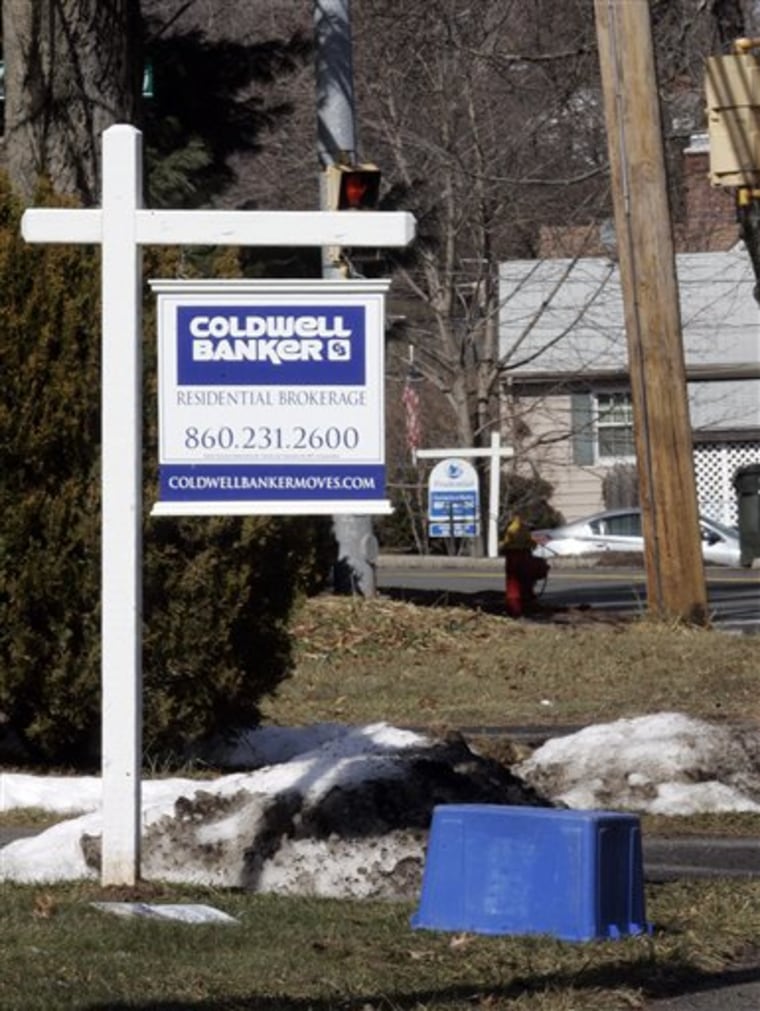Home foreclosures soared to an all-time high in the final quarter of last year and are likely to keep on rising, underscoring the suffering of distressed homeowners and the growing danger the housing meltdown poses for the economy.
The Mortgage Bankers Association, in a quarterly snapshot of the mortgage market released Thursday, said the proportion of all mortgages nationwide that fell into foreclosure shot up to a record high of 0.83 percent in the October-to-December quarter. That surpassed the previous high of 0.78 percent set in the prior quarter.
"Clearly it's the worst it's been," chief association economist Doug Duncan said in an interview with The Associated Press.
More homeowners — at the same time — fell behind on their monthly payments.
The delinquency rate for all mortgages climbed to 5.82 percent in the fourth quarter. That was up from the 5.59 percent in the third quarter and was the highest since 1985. Payments are considered delinquent if they are 30 or more days past due.
Homeowners with tarnished credit who have subprime adjustable-rate loans were the hardest hit. Foreclosures and late payments for these borrowers also swelled to all-time highs in the fourth quarter.
The percentage of subprime adjustable-rate mortgages that entered the foreclosure process soared to a record of 5.29 percent in the fourth quarter. That was up from 4.72 percent in the prior quarter, which had marked the previous high. Late payments skyrocketed to a record high of 20.02 percent in the fourth quarter, up from 18.81 percent — the previous high — in the third quarter.
The association's survey covers almost 46 million home loans nationwide.
"Mortgage credit quality is deteriorating fast," said Mike Larson, a real-estate analyst at Weiss Research.
The worsening foreclosure and late payment figures come as fears grow that the country is teetering on the edge of a recession or in one already.
The wave of foreclosures threatens to deepen the already severely depressed housing market. The homes people are forced out of add to the big glut of unsold homes already on the market. That forces even more cutbacks by homebuilders, taking a big bite out of national economic activity. Harder-to-get credit, meanwhile, has thwarted would-be home buyers, aggravating problems in the housing market.
Homeowners with spotty credit histories or low incomes who took out higher-risk subprime adjustable-rate mortgages have suffered the most distress as the housing market went from boom to bust. Initially low interest rates that reset to much higher rates have clobbered these borrowers. With home values dragged down by the slump, many borrowers were left with mortgages that eclipsed the value of their homes.
"Declining home prices are clearly the driving factor behind foreclosures, but the reasons and magnitude of the declines differ from state to state," Duncan said.
In a separate report, Americans' percentage of equity in their homes has fallen below 50 percent for the first time on record since 1945, the Federal Reserve said.
Homeowners' percentage of equity slipped to a downwardly revised 49.6 percent in the second quarter of 2007, and declined further to 47.9 percent in the fourth quarter — the third straight quarter it was under 50 percent. That marks the first time homeowners' debt on their houses exceeds their equity since the Fed started tracking the data in 1945.
Even with relief efforts under way by industry and the government, Federal Reserve Chairman Ben Bernanke, earlier this week, warned that foreclosures and late payments on home mortgages are likely to rise "for a while longer."
The MBA's Duncan agreed. "We expect some increases in the next couple of quarters," he said. The economic slowdown, harder-to-get credit and lofty energy prices are adding to the strains, he said.
Against this backdrop, Bernanke called for additional relief and urged lenders to help distressed owners by lowering the amount of their loans. "This situation calls for a vigorous response," Bernanke said in a speech Tuesday.
Bernanke's recommendation for lenders to reduce the amount owed on troubled home loans goes beyond the position staked out by the Bush administration. The Fed chief, however, didn't go as far as to endorse some proposals embraced by Democrats on Capitol Hill.
Among the initiatives promoted by the administration is allowing some homeowners with certain subprime home loans to freeze their interest rate for five years.
California and Florida continued to represent a disproportionate share of the country's new foreclosures. The two states accounted for 30 percent of mortgages starting the foreclosure process, the association said. "In states like California, Florida, Nevada and Arizona, overbuilding of new homes created a surplus that will take some time to work through," Duncan said. That glut has pushed down house prices, he said.
The fallout afflicts neighborhoods, too.
"Foreclosures not only create personal and financial distress for individual homeowners but also can significantly hurt neighborhoods where foreclosures cluster," Bernanke said.
